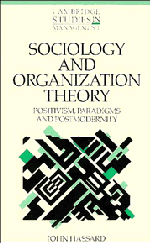Book contents
- Frontmatter
- Contents
- List of figures and tables
- Acknowledgements
- Introduction
- 1 Foundations of orthodoxy
- 2 The hegemony of systems
- 3 From functionalism to fragmentation
- 4 Closed paradigms and analytical openings
- 5 Multiple paradigm research
- 6 Postmodernism and organization
- Notes
- Bibliography
- Author index
- Subject index
- Cambridge Studies in Management
2 - The hegemony of systems
Published online by Cambridge University Press: 03 May 2011
- Frontmatter
- Contents
- List of figures and tables
- Acknowledgements
- Introduction
- 1 Foundations of orthodoxy
- 2 The hegemony of systems
- 3 From functionalism to fragmentation
- 4 Closed paradigms and analytical openings
- 5 Multiple paradigm research
- 6 Postmodernism and organization
- Notes
- Bibliography
- Author index
- Subject index
- Cambridge Studies in Management
Summary
Introduction
Having described how functionalism in social science has its roots in the writings of Comte, Mill, Spencer and Durkheim, we now illustrate how this approach offers a basis for characterizing organizations as ‘open systems’.
We start by noting how functionalist thinking became influential in anthropology and sociology. Thereafter we describe how sociological functionalism was joined with general-systems theory to form a generic systems model for organizational analysis. Finally, we argue that the systems approach attained an intellectual hegemony in organizational theory for almost half a century, mainly through professing a prior claim to empirical explanation.
From this analysis, we see how the systems metaphor underpins the human relations, socio-technical and contingency theories of organization, and informs popular textbooks on business and management.
Functionalism in social science
We have outlined the contributions made to functionalist sociology by the founding fathers of social science. We note, however, that none of them uses the term ‘functionalist’ to characterize the philosophy of their own work. Instead the origins of an explicitly functionalist approach to social science lie in anthropology, and particularly in the works of Bronislaw Malinowski and A. R. Radcliffe-Brown.
- Type
- Chapter
- Information
- Sociology and Organization TheoryPositivism, Paradigms and Postmodernity, pp. 19 - 48Publisher: Cambridge University PressPrint publication year: 1993



